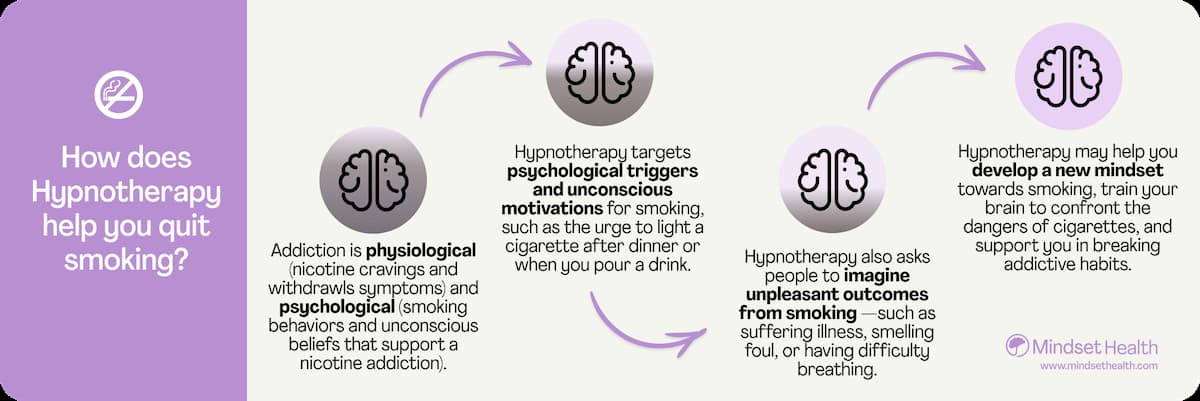
It's almost another year gone by, and you still haven't quit smoking. How long has that topped your New Year's resolution list? You probably want to quit, and every year, you declare you'll finally be a nonsmoker. What happens? A few days or months down the road, and you find yourself lighting up again. Was it stress? The new job? Cravings? Nicotine is very addictive, and it's not easy to find a program that works easily and permanently. Most smokers report that they've tried to quit several times, but they pick it up again. Don't despair if that describes you – you can quit. Hypnosis can help you do it easily and quickly.
What is Hypnotherapy for Smoking Cessation?
A hypnotherapy smoking cessation programme helps current smokers quit smoking without pain when other smoking cessation interventions have failed. It involves clinical hypnosis performed by mental health professionals with extensive training in the field of hypnotherapy to help you identify the triggers that cause you to smoke and make changes to your subconscious mind.
To appreciate the effectiveness of hypnosis for smoking cessation, you first need to understand what the subconscious mind is and how it works. Our subconscious mind controls most of our behaviour automatically (unconsciously), such as when we walk or talk, as well as how we behave when we are nervous, feel stressed or experience other strong emotions.
Everything that you do, think and say is stored in the subconscious mind. This information is stored into files which can be accessed by your brain with ease. The subconscious mind does not reason, make judgement calls or analyse things like the conscious part of the mind does. It is like a computer that accesses the files and retrieves the information it needs to perform a task.
Working with hypnotherapy for smoking cessation involves making changes to your subconscious mind and how it affects your automatic behaviours, so that you are no longer triggered to smoke.
As smoking cigarettes is deeply rooted in the subconscious mind, it is both a physiological and psychological problem. Hypnotherapy helps smokers develop a new perception of smoking and its dangers by targeting the psychological attributes that trigger the smoking habit and motivating them to take a graphic look at how nicotine addiction can negatively affect their health.

Source: mindset health
Benefits of a Hypnotherapy for Smoking Cessation Programme
The average smoker, as well as chronic smokers whose several quit attempts and inability to deal with withdrawal symptoms, will benefit from hypnotherapy sessions and never relapse. This method has been found to be effective when used by itself or in combination with other therapies such as counselling, cognitive-behavioural therapy and neuro-linguistic programming.
People who have been through hypnosis sessions for smoking cessation say that it is helpful in reducing the symptoms of nicotine withdrawal and cravings. In most cases, people have found that they gain a better understanding of how their own mind works when they quit smoking with hypnosis.
Hypnosis is an effective treatment for stopping smoking, with over 80% of people remaining abstinent after a single session. Success rates increase with multiple hypnosis sessions and by using hypnotic suggestions.
The hypnotherapy technique for assisting current smokers in quitting for good is simple and straightforward. Using hypnosis, the hypnotherapist guides you into a relaxed, trance-like state where you can explore your thoughts regarding your reasons for smoking, develop mental images of the unpleasant outcomes of your habit, and be receptive to positive suggestions on how to quit.
Programmes to Help You Quit
There are several smoking cessation programmes available. Some require doctor's visits for medication. Another popular choice is nicotine replacement therapy, which can be delivered through nicotine patches, nicotine gum, or even as an oral spray. It still provides your body with nicotine to help curb the cravings and ease withdrawal symptoms. While it's great to take these steps to quit, these programs have a downside. They take time, some lasting up to a year before you can finally say that you're living smoke free. Also, they can be costly, and they have warnings about potential side effects.
Hypnosis is the most effective and natural way to provide powerful motivations for smoking cessation. It's also one of the quickest and least expensive. Since you're not relying on chemicals (either topically or internally), you'll find no side effects like those associated with the other programs. Hypnosis is a natural state, where your therapist guides you into a concentrated state of complete relaxation.
Questions to Ask
Before you schedule your initial session with a healthcare professional who specialises in the process of hypnosis for smoking cessation, you'll want to ask a few questions regarding the smoking cessation programme. These include:
- How many sessions will it take?
- How successful is the therapist's program?
- What's the average cost for a single session?
- What does the program entail (is it strictly hypnosis)?
- What's the difference between hypnotherapy and other psychological treatments?
The hypnotherapist will also ask you for your personal information, including how long you have been smoking cigarettes, how many cigarettes you have smoked per day, what got you into the habit of smoking, any health problems you may have, other programmes or alternative smoking cessation aids you've tried in the past, and your level of commitment to quit smoking cigarettes.
Your answers will help the therapist decide on the best way to help you. Your commitment is one of the biggest indicators of your success. If you wish someone would make you stop, then hypnosis isn't going to work. It's not magic, where you suddenly become a nonsmoker. You must be open to the programme and dedicated to taking the steps to make it work.
This article was originally written by hypnotherapist Christine Ford . Updates were made to include more updated information.
Originally published on Dec 24, 2010







